-
Searching for Beacons
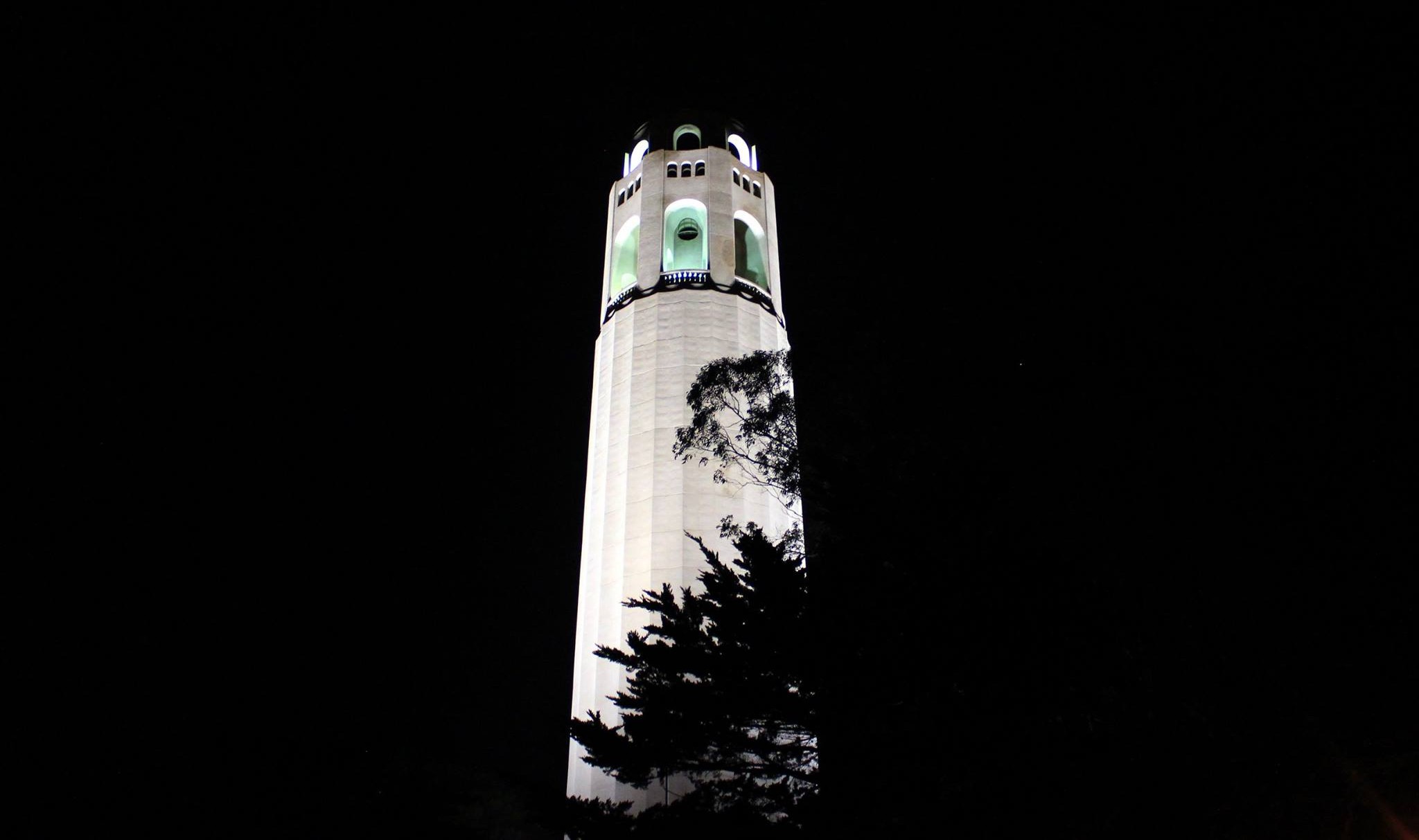 Coit Tower, Telegraph Hill, San Francisco
Coit Tower, Telegraph Hill, San FranciscoWhat a ten days it has been.
Grand milestones celebrated. Childhood friends revisited. Animated rallies attended. Unfortunate losses counted. All amidst an uncomfortably stratified yet contiguous set of urban existences. More grating to this observer each passing day. A source of growing defeatism rather than drive, though the latter’s leading quota is irreplaceable.
Port City hardly ever disappoints. That post, by the way, is not only my brief ode to Vancouver, but a reflection of its place in my life. A larger metaphor for a transitory phase of existence, one that continues to extend beyond expected timelines. I mean, I have been in Prince George for nearly four years. I should have made a home of this place. And yet… the apartment continues to resemble a waystation. It was about this time last year when I was musing about transience and its associated luggage. Funny how the seasonal patterns ripple in time.
It is a question still on my mind: Quelle heure est-il au Paradis?
Today’s photo is of a tower many of you may be familiar with, its cold white concrete illuminated at night. A landmark – an imposition of beauty – on a similar metropolis not so far away.
Perhaps this picture came to mind because this traveler’s thoughts are on beacons, or lack thereof. The course-correcting kind that arrive in the form of people, decisions, and moral will that seem to always be scarce. We are all living in Omelas and happy to champion its cruel vision.
-
The Lesser Spotted Sedan
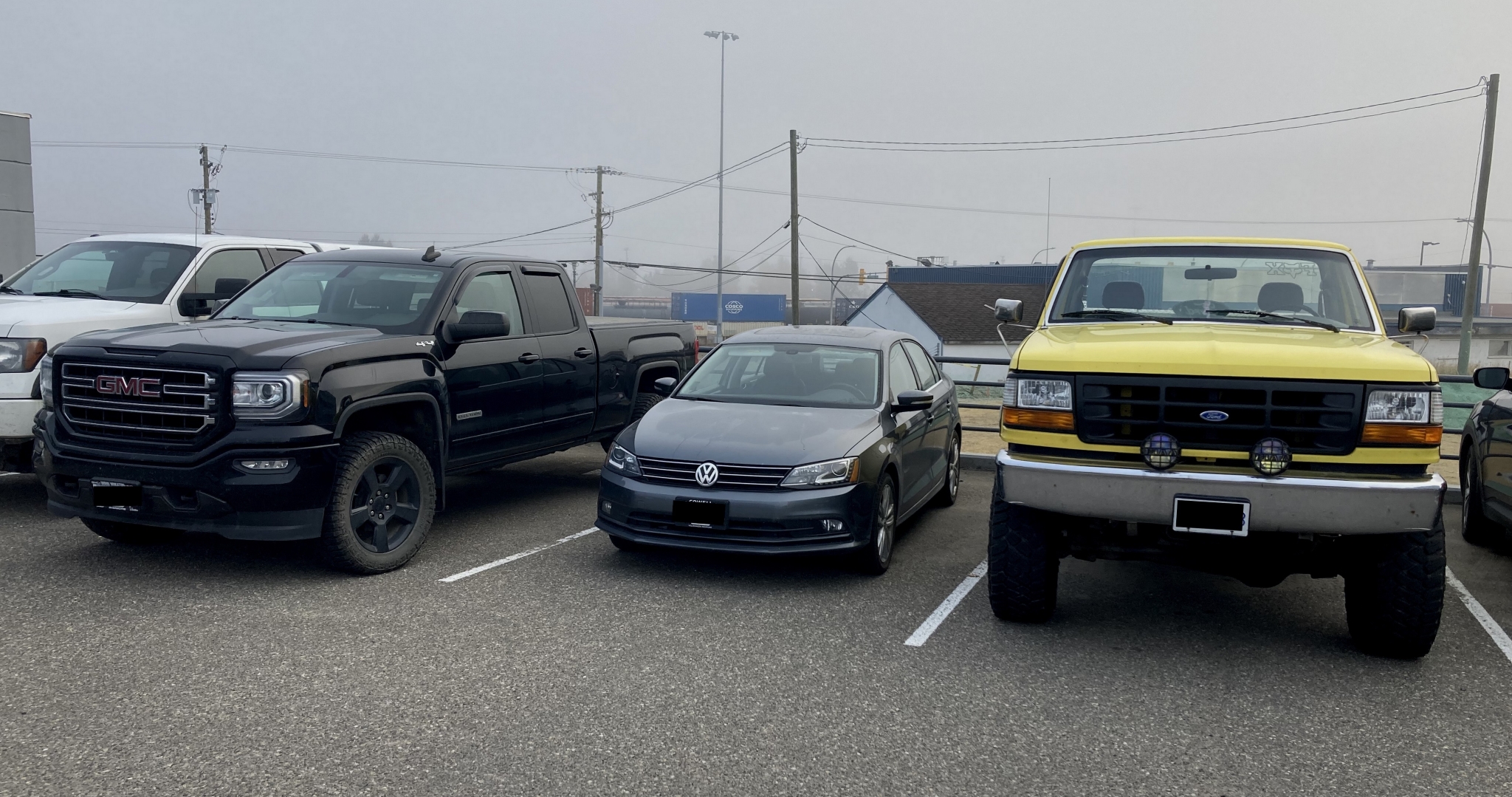 This week’s photo: the lesser spotted sedan in its natural habitat, parked among its much larger (and far more widespread) roadmates in Northern B.C.
This week’s photo: the lesser spotted sedan in its natural habitat, parked among its much larger (and far more widespread) roadmates in Northern B.C.Driving in this city has become so annoying that I have effectively curtailed use of my vehicle to the bare minimum. My sedan’s tank is about 3/5 full and my budget app says the last time I filled up was February 11. Good. Box checked. (Disclosure: this is entirely due to a set of temporary circumstances which have afforded me the option of working from home.)
Burning less ancient bio-residue is certainly a win, and my primary concern remains the environment, but I will use this opportunity to talk about how unsafe the roads are in this ‘car city’. Drivers are not careful (just visit r/princegeorge and you will find plenty of anecdotes about erratic driving practices), conditions are often testing (the long winters can be rough), and the city is not at all walkable. Unlike other cities where pedestrian paths and safety are prioritized – say, clearing sidewalks of snow first – in PG, automated transportation always gets first dibs in council budgets. The unavoidable nuisance of driving is compounded by the fact that public transit is poor, the populace is unnecessarily spread out, and a certain, entitled NIMBYism prevents denser and more sensible, sustainable development.
Mostly, though, it is those damned trucks that make navigating the roads tiring. Everyone is rolling around in comically large vehicles. I get that this is an industry town where lots of people are engaged in outdoor sports, but it is representative of plenty of broader trends. (See here 1996’s Taken for a Ride, a foundational documentary which discusses some of the wider forces at play. Mainly: the car lobby’s successful efforts at fighting public transit, eco-conscious development, and regulations, at the cost of our general quality of life. Relevant to the entire North American context.)
For example, when I am up front taking a left at a major intersection, I can barely see behind the large trucks also waiting to turn in the opposite direction, effectively blocking the entire lanes behind them. I often need to inch forwards until I am almost into the opposing lane before I can confirm no oncoming traffic. Not ideal. Moreover, PG has a lot of randomly placed pedestrian crosswalks on streets like fifth avenue (busy during morning/evening commutes). If you are in a sedan with a truck slightly ahead, your view of anyone crossing, or looking to cross, is almost completely obscured. And in this city, if you dare slow down or drive with caution, you get honked at immediately. How dare you stick to the limit when the person behind is trying to go 80km/h in a 50 zone? Everyone has somewhere where they need to be right at that moment, it seems.
-
A Comment on Material Consumption
Everyone has so much stuff.
I am blown away by it all. Every time I enter someone’s home. The amount of clothes, furniture, dishes, glassware, stationary, art, greenery, drapery, tools, toys, and collections. Piles of paper spilling over each other. The electronics! Appliances, devices, consoles, and ‘smart’ tech adorning surfaces. Boxes hidden away in corners or stashed atop shelves unseen. Things on the walls, ground, running along baseboards or dangling from cords. Objects slowly shifting around, following seasonal motions akin to planetary retrogrades. Their whirring, ticking, clicking, rattling, and cuckooing punctuating the enclosed din. A cozy clamor to which most are conditioned.
Stuff stuffing abodes, each a menagerie inviting a sift-through by Walter Benjamin wannabes. For this onlooker, genuinely mystifying stuff.
Let me clarify. We are speaking here of material possessions. All of us inhale different forms of cultural output. We frequent theaters, concert venues, museums, cultural sites, and share our love of art in public spaces. At home, we engage with films, shows, interactive media, etc. Some of the latter overlap with objects that must be owned. Fine; games are a collective tie. It is the rest of it – those bobbleheads in mint condition – that I cannot fathom. I often wonder about each item’s use-over-time-ratio. How many months go by between its uses? How long did it take to become ignored once its novelty wore off? How many pieces of crap have been left in that drawer untouched for years? Of course, most never track their consumption. And for those who would argue for the deep cultural attachments to objects, commentary here concerns our proclivity for excess.
I admit, if the average consumer had my spending habits, the entire economy may collapse.
-
Words for a Despondent Public
A quick update: ‘Weekly Picks’ posts will return to the blog this Sunday, February 9. I also plan to put together a bit of an explainer within the next couple of weeks on the method behind how I come across those articles/essays/videos. Stay tuned.
Plenty in the news that is levying anxiety on both sides of the 49th parallel these days. Those of us fortunate enough to be in the global minority enjoying stable democratic institutions can never really adopt a complacent approach.
Just a couple of videos for you today. Words of wisdom for troubled times.
Some takeaways:
(@3:00) Treat differences like a resource, not a problem.
(@11:15) Creative solutions are not lacking.
(@13:50) Democracy is something you do, not something that is.“Do not despair. The misery that is now upon us is but the passing of greed – the bitterness of men who fear the way of human progress. The hate of men will pass, and dictators die. […]
You, the people, have the power…the power to create happiness. You, the people, have the power to make this life free and beautiful.”
We dare not disengage.
-
On 2024’s Palette
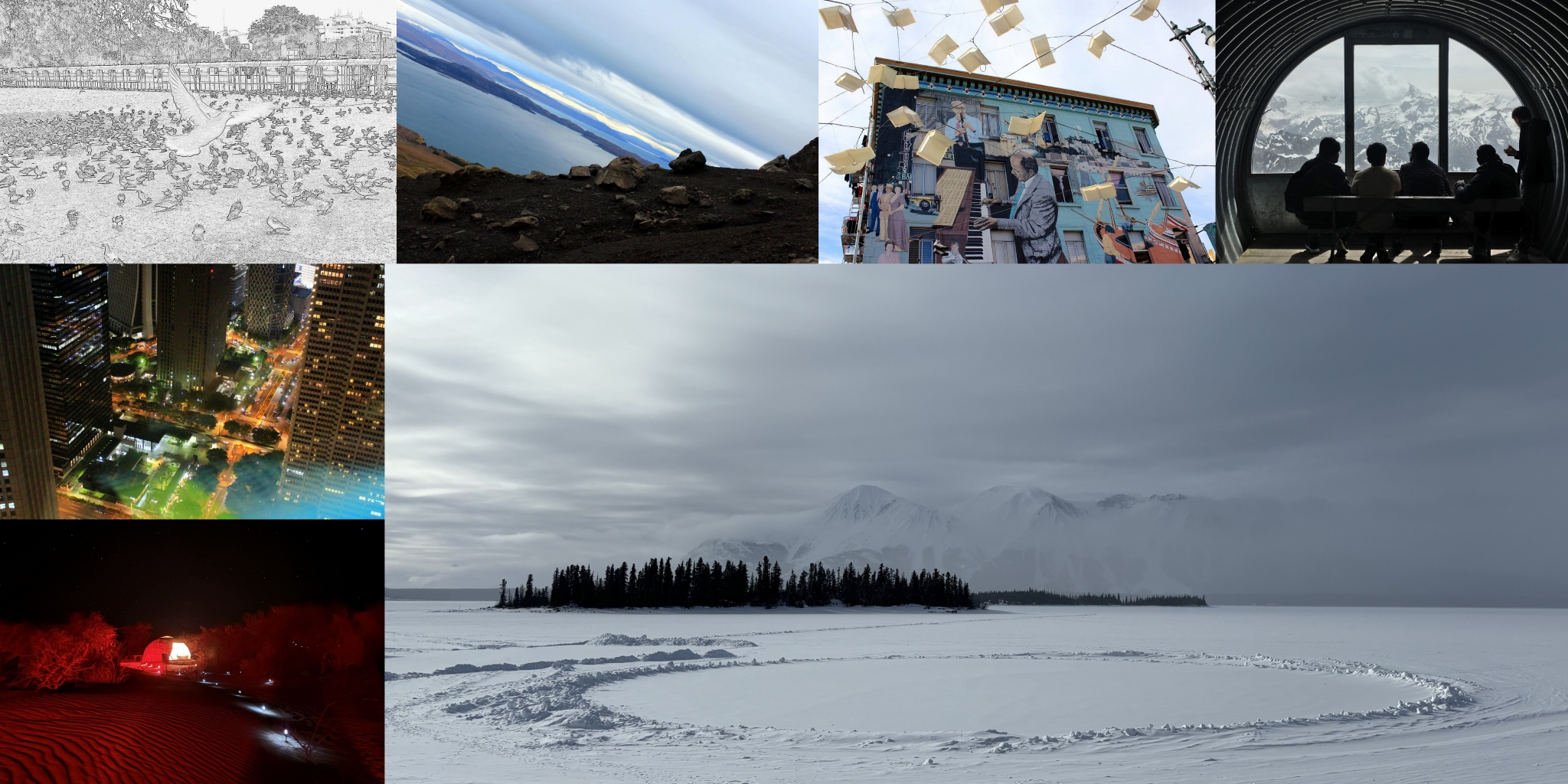
Something a little different to wrap up the orbit.
In Difference turns 1 next week. It was the first few days of January last year when I began setting up this space. Researching self-hosting options, reintroducing myself to the WordPress platform, adjusting code, and attempting to conjure inspiration. Funny what a temporary surplus of time and tranquility will manifest.
The aim was to add a habit of writing into the repertoire. The levels of originality or depth were always going to fluctuate, but I had hoped to establish a rhythm that could spur on other creative impulses.
At this juncture, I can admit to the patchy nature of the experiment. Work, travel, and other commitments have eaten into the hours budgeted towards introspection. Yet even the small amount of catharsis afforded by this exercise has been enough; there is plenty foundational to build on.
With that in mind, I was looking back through the year’s posts and noticed how often I shared images with little to no information. Though they were connected to the thoughts being relayed, it was not always clear how they informed the substance of the piece. The pictures, captured or constructed, felt ornamental. So, I thought I would take this opportunity to add a little more context to where they came from or why they were attached to the reflections.
A chance to resurface the musings with some additional insight. See the collection below; I hope it is somewhat illuminating.
-
Vancouver’s Veneer
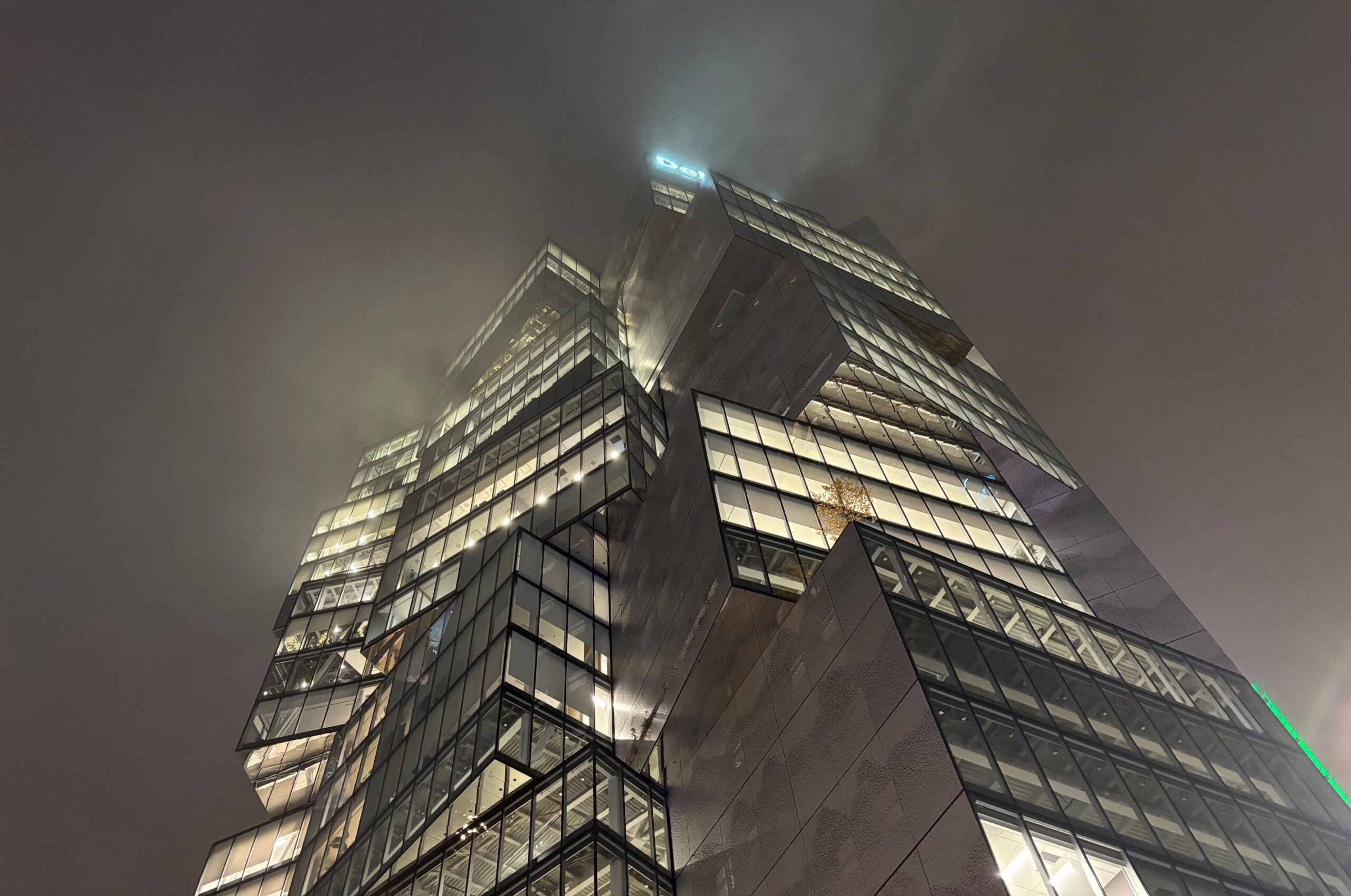
A planet hurtles past a solstice towards perihelion, and Port City rejoices.
It is a place where skyscrapers sprout from mist. Garish projections fulfilling prophecies written into fiction decades past. Architecture akin to its siblings on similar coasts, in form not function, leering over paved grids. Scaffolding and circuitry facilitating stop-start processions of suits and skirts, vagabonds and ragamuffins, the listless and the determined. A concoction of noise, purpose, and energy.
The chilled holiday haze settles and departs hastily, sandwiching daily showers and windstorms. A humid, wintry alchemy that sustains a world of mirrors – darkened and drenched facades extending above soaked streets. The buildings floating on fog awash in dull greys punctuated by neon. The city’s translucent wrapping a liminal, reflective space dividing polluted skies above from frenzied avenues below.
It is an amalgam of engines, passages, and stages. Everyone descends upon its storied stations to perform or spectate. All roads, waterways, airways, and thought-streams lead to Port City, a frequented corner of an ever-rotating globe; an abstract geometry. Where people walk, drive, fly, train, and float around, taxied between physical, cultural, and economic portals. ‘Skipping town’ a regular and expected exercise, an offering on the cornucopic menu.
-
Desk Psychology
Sunday tends to be chore day. The cramming of so many errands into daylight hours, dwindling from the get-go as a countdown runs down to the week ahead. Cleaning, laundry, groceries, appointments, community events – some things pre-scheduled and some pushed out of necessity – to this, the end of the weekend.
Monday arrives, always too soon. Colleagues crack the same twelve jokes as everyone shares memes and gifs highlighting each aspect of a fresh work week. We search to caffeinate ourselves (our souls, more than anything) to address procrastinated to-dos that cannot be excused away without off-time looming.
Tuesday is probably the worst. Too close to the beginning of the week and too far from the end. Is that why so many drop-in leagues are scheduled for the evenings? Or why movie tickets are cheaper? Is anyone taking advantage of Taco Tuesday?
Wednesday is, anecdotally, interesting. Some consider it tough while others finally find their labor groove. A chance to gauge productivity for all with two days past and two days ahead; what has been accomplished and what remains to be done? Perhaps the longest day of the week for all those counting the hours.
Thursday feels better. The weekend nears. Laissez-faire inclinations have a habit of overtaking more motivated internal drivers.
Friday could be filled with anything – meetings, deadlines, last-minute requests – all are met with a strange optimism. Promise-ladened speech of things to look forward to ‘the coming week’ is the nitrous fuel that sees everyone through to the most anticipated End of Day. Labor done and dusted, perhaps a later night ahead.
Saturday is about as blissful as it gets. Anxieties around personal tasks can be forwarded another day. Personally valuable or amusing endeavors are undertaken. A weekly interruption in a work-dominated calendar.
-
Elections, II
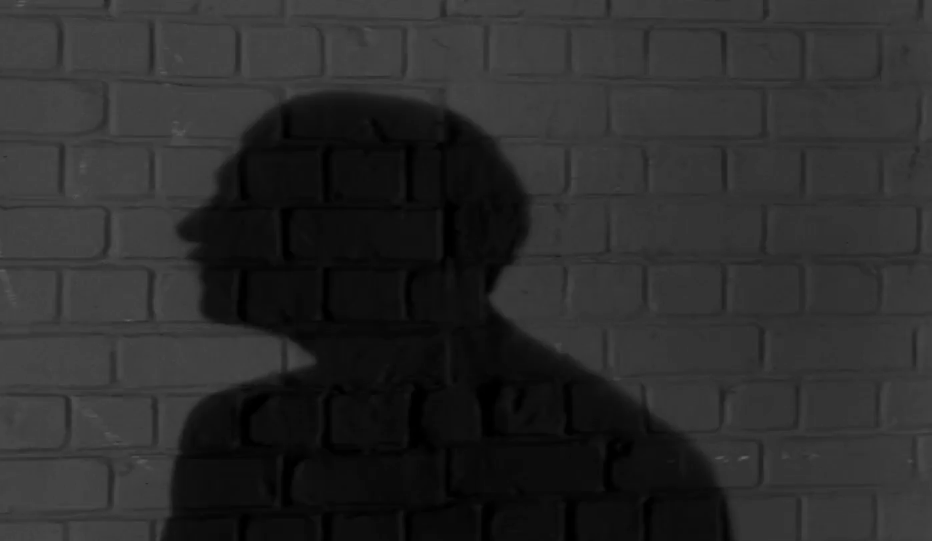
Portrait of a bush-league Führer named Peter Vollmer, a sparse little man who feeds off his self-delusions and finds himself perpetually hungry for want of greatness in his diet. And like some goose-stepping predecessors he searches for something to explain his hunger, and to rationalize why a world passes him by without saluting. That something he looks for and finds is in a sewer. In his own twisted and distorted lexicon, he calls it ‘faith’, ‘strength’, ‘truth’.
– Rod Serling, from the opening narration of “He’s Alive”
This post is a continuation of the rumination begun here.
It is conference season in BC. This past week, Indigenous leaders across the Northern Region gathered here in Prince George to have their annual governance caucus. Near the end of the event, space was given for reflection on treatment of Indigenous veterans, as Remembrance Day loomed. A speaker shared some firsthand accounts from Indigenous voices dating back a hundred years – from those who had fought in world wars all the way to more recent conflicts in the early twentieth century. Soldiers who had experienced more equality facing bullets abroad than within systems and structures at home. The speaker imparted stories close to home, of family or community members whose sacrifice had gone unacknowledged or been taken for granted, as their fight for civil rights or against discrimination on Canadian soil continued.
The speaker relayed one tale of Indigenous soldiers being asked to stand aside from their peers during a memorial ceremony, while the Prime Minister and dignitaries walked past. All the veterans present, except for the Indigenous ones, being given a chance to shake hands with the politicians. A gesture congruent with contemporary societal stratification.
I was sitting in the audience and could not help but draw parallels between the true accounts being relayed and all-too similar fictional narratives in Toni Morrison’s Home, in which the protagonist Frank (a black man) returns from the Korean War, the first desegregated conflict in American history, to a country that refuses to acknowledge his humanity. Morrison rushes us through Frank’s encounters with numerous characters as he tries to search for his sibling. She barely mentions race, because she does not have to; the behavior of institutions and the people they envelope make everyone’s ethnicities blatant. A simple run-in with police is jarring enough for the reader, as the passage is as representative of black tribulations in the 1950s as it is today.
The stories conveyed at the caucus came two days after we all learned of the election outcomes in the United States. The world’s second-largest democracy having undergone hundreds of votes for its new leader, its upper and lower houses of congress, numerous state governors, and dozens of binding referenda on issues from healthcare to criminal justice reform. The thread that the stories carry – of the historical and ongoing deployment of discrimination by those in power – lies deeply intertwined with history being written as the results of these elections continue to roll in.
To understand all of this is to not understand it at all. How did we get here?
-
Elections
 BC election results as displayed on CBC News, courtesy Elections BC.
BC election results as displayed on CBC News, courtesy Elections BC.The current era of Indian political and cultural life began in earnest on May 16, 2014. The day that the results were announced of a tide-turning general election in the world’s largest democracy, after more than half a billion votes had been cast and counted.
A movement with populist and nationalist cornerstones, burgeoned by an unprecedented social media campaign and primarily appealing to economic interests, took its opportunity to bring the BJP and its stalwart figurehead to power. The National Congress and their allies could barely put up a fight; their more secular vision hardly enough to hide their historical shortcomings against endemic problems (like corruption) blighting the political class.
Modi’s ascension was also enabled by the media, which was largely corporately controlled and friendly towards politicians who would benefit the socioeconomic elite. The narrative of the inevitable orange wave was paralleled across all major networks. The excusal of extremist tendencies and historical whitewashing was depressingly familiar.
I was walking along Mumbai’s Marine Drive that day, the waters of the Arabian Sea calmly swirling around its tetrapods. Television screens could be glimpsed through storefront windows and opened doors, showing updated parliamentary seat counts as the results rolled in. It was a dry day across the nation and an air of jubilation could be sensed in the humid atmosphere. People in the country’s largest city were celebrating.
All of this felt odd.
-
Chilean Vistas
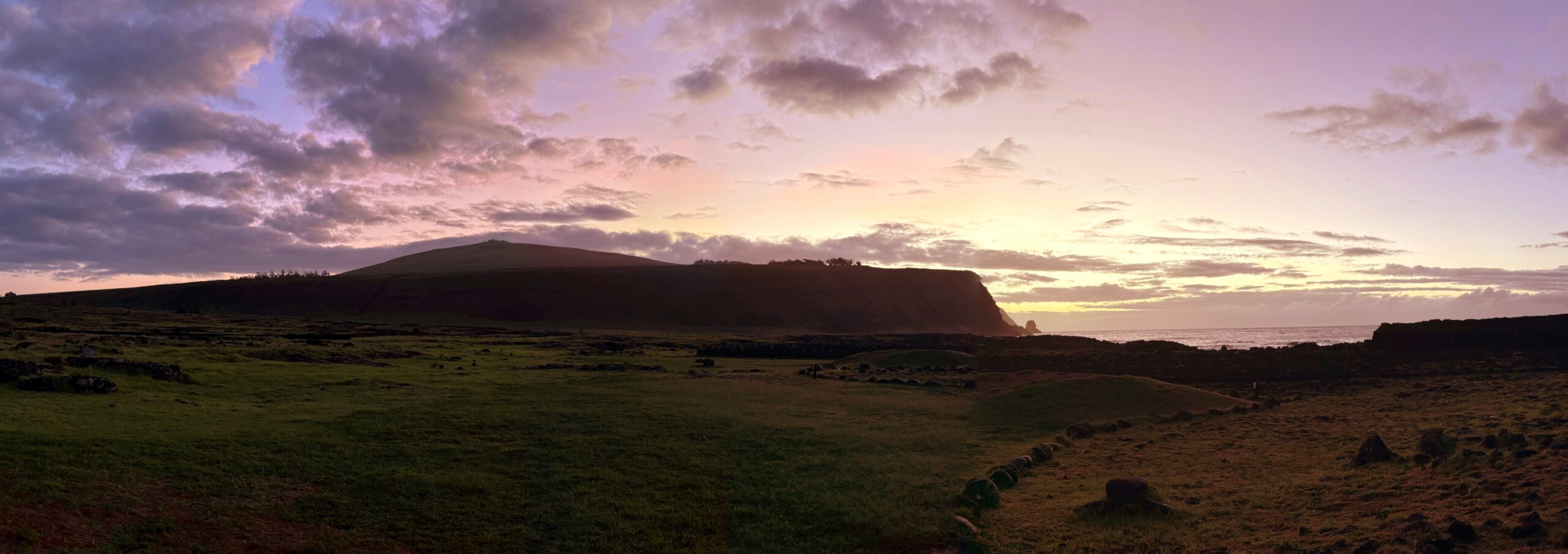 Ethereal tones filling the sky just prior to sunrise at Ahu Tongariki.
Ethereal tones filling the sky just prior to sunrise at Ahu Tongariki.Maybe it was the expansive landscapes. Or the yearning to capture more in every frame. Or perhaps it was just a time-saving exercise.
But instead of trying to stand still and slowly rotating with my phone’s panorama function turned on, I decided to take a lot of overlapping shots of the scenery and stitch them together using software after returning home. Faster in the present, more work for the future, and with plenty of mixed results. There were some advantages, like greater detail or more natural, linear outputs. There were also some cons. A narrower field of view being the biggest one unless numerous clicks were obtained from different angles preserving the same brightness. A difficult task when the sun was lower in the sky.
The panorama function was not always an option, either. The winds of Patagonia above certain summits were strong enough to ruin every single video or continuous shot attempted.
I recall a more practiced, careful approach back when I used to have a DSLR camera. For this journey however, a quick sequence of images close enough together had to suffice. This was not a photography-focused adventure where we paused too often to line up the perfect composition.
Anyway – here are some panoramas taken from different corners of a country with an abundance of geographical diversity.